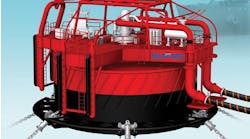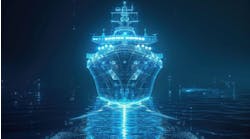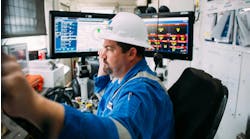Norway in Indonesia Bakrie link bolsters Kvaerner's turnkey oil and gas capability
A GMS membrane system for CO2 removal delivered by Kvaerner Process Systems, Houston.
The Kvaerner group, which has been active in Indonesia for several years, has taken a new step forward with the formation of Kvaerner Bakrie Engineering. Bakrie is an Indonesian industrial conglomerate with interests in the power and mining sectors, and which has just acquired offshore producing interests in the Malacca Straits. It makes a strong local partner for Kvaerner, according to David Wilson, Kvaerner Bakrie's general manager.
As elsewhere, Kvaerner's strategy in Indonesia is to build a turnkey capability in oil and gas projects. In addition to its local presence, which comprises a representative office as well as Kvaerner Bakrie, it can call on the group's varied resources.
Many of these are available within the region. Kvaerner R J Brown, which specializes in pipeline engineering, is based in Singapore and has offices in Australia. Also in Singapore is Kvaerner National, the wellhead and xmas tree manufacturer, while Kuala Lumpur is the base for Kvaerner Process Systems and Kvaerner Petrominco Engineering. Where required, support is also available from Kvaerner Engineering, Kvaerner H&G, Kvaerner FSSL, Kvaerner Energy, and other group companies.
In addition to the services, there is also a wide range of Kvaerner products. This extends from topside processing equipment to just about everything required for subsea production, including control systems and umbilicals.
Services which are not available within the group can be accessed through joint ventures. "In Southeast Asia it's possible to exist as an EPC contractor without a fabrication yard and without installation ability," Wilson says. "We have very good relationships with other contractors."
One of these is Bouygues Offshore, with which Kvaerner Bakrie is currently performing a contract. It has a steel fabrication yard in Betang which is potentially available for inclusion in turnkey bid packages. On the pipelay side, one of Bakrie's major shareholders is also part-owner of the Shillelagh lay-barge, which means the joint venture can include this capability in its bids for EPIC contracts.
Kvaerner, whose subsidiary Kvaerner Concrete Construction built the Troll Oil platform, has also been beating the concrete drum. Concrete substructures could be the answer for the topside loads of 30-40,000 tonnes which are under consideration for some projects, Wilson says. A couple of sites have been identified which have the requisite water depth for concrete construction, and concrete and aggregate are in good supply.
Kvaerner Bakrie itself got off to an encouraging start, winning a contract for preliminary engineering in support of a contractor bid on the day when the deed of establishment was signed in mid September.
It now hopes to establish its credentials as a turnkey provider on Arco's Terang Sirasun project, for which bid invites are due out next spring. The company is offering a totally subsea concept, involving the individual tie-back of some 32 gas wells into a 70 km pipeline feeding into the TransJava trunkline (for which KvRJB provided engineering and project management).
The field would be remotely controlled from shore via a control relay station located on a floating barge installed over the field - an industry first, according to Wilson. Kvaerner would provide engineering and project management through Kvaerner Bakrie, and all the subsea hardware, including tools for diverless installation and maintenance. It could also supply some of the process equipment for the onshore terminal which forms part of the project. One of the major attractions of the Indonesian market for Kvaerner is of course Esso's huge but slow-moving Natuna Sea development. Commitment by field partners is now due by late 1996, with first gas flowing in 2004.
In addition to its other capabilities, Kvaerner can offer its expertise for the removal of the high carbon dioxide content in the Natuna Sea reservoir fluids. It designed and is currently building the 7,500-ton CO2 processing module for Statoil's West Sleipner project. It has also acquired the Grace membrane system for CO2 removal developed in the US.
For the time being the key-words for Natuna appear to be patience and careful groundwork. But the offshore sector in Indonesia is active, and Wilson is optimistic that other projects will come forward on which Kvaerner will be able to bring its varied skills to bear.
Copyright 1995 Offshore. All Rights Reserved.




